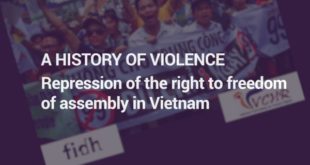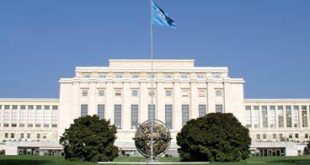Dear Mr. President,
In a few days, you will meet with Vietnamese Prime Minister Phan Van Khai, the highest-ranking diplomat to visit the United States since the end of the Vietnam War. Vietnamese at home and abroad will be following this visit with close attention, and also with much concern.
In democracies, it is natural for statesmen to meet to strengthen links between the people they represent. But Vietnam is not a democracy, and Phan Van Khai is not an elected representative of the people. He is an official of a one-party state, a repressive regime that stifles all opposition and imposes a political monopoly of over 2 million Communist Party members on 81 million Vietnamese. Prime Minister Phan Van Khai is coming to the United States not to express not the concerns and aspirations of his citizens, but those of the ruling Communist Party of Vietnam.
America has always stood up for democracy and freedom. This year, in your second inaugural speech, you made a solemn pledge to uphold this tradition when you declared : “anyone who lives in tyranny and hopelessness should know : The United States will not ignore your oppression, or excuse your oppressors. When you stand for liberty, we will stand with you”.
Today, millions of Vietnamese suffer oppression and harassment because of their advocacy of freedom, democracy and human rights. I am calling upon you, Mr. President, to heed the voice of the oppressed, not their oppressors, in your coming meeting with Prime Minister Phan Van Khai.
During your Presidency, you have proved that diplomatic pressure can bring concrete results. In September 2004, for the very first time, you placed Vietnam on a black-list of “counties of particular concern” (CPC) for egregious violations of religious freedom. In response, Vietnam made several gestures and promises of religious reforms. These promises are welcome, but they are not actions, and we fear they will remain dead letter unless the United States continues to press Vietnam to make tangible, concrete progress in religious freedom and human rights.
Vietnam is past master in deluding its people and the international community, and Prime Minister Phan Van Khai himself symbolizes the broken promises of the Vietnamese regime. In April 2003, he raised hopes of new religious tolerance by meeting prominent dissident Thich Huyen Quang, Patriarch of the banned Unified Buddhist Church of Vietnam (UBCV) in Hanoi. Yet just months later, in October 2003, these hopes were dashed when the government launched a most brutal crack-down against the UBCV, placing eleven UBCV leaders under detention, isolating hundreds of UBCV pagodas and intimidating UBCV followers. Today, repression continues against the outlawed UBCV. Despite protests by the United Nations Working Group on Arbitrary Detention, Patriarch Thich Huyen Quang (87) and his Deputy, Venerable Thich Quang Do (76) remain prisoners inside their pagodas after more than 25 years in detention without trial. UBCV monk Thich Thien Minh, released in a government amnesty after 26 years in reeducation camp, recently received death threats simply for denouncing Vietnam’s inhuman prison conditions to the foreign media.
Not only Buddhists, but also Protestants, Mennonites, Catholics, Hoa Hao Buddhists and Cao Dai are subjected to harassments and detention today. Hmong Christians have been murdered. Christian Montagnards returning to Vietnam after fleeing to Cambodia to escape persecution face ill-treatment and arrest, despite Hanoi’s pledge to protect their security and prohibit all retribution. In violation of the “Memorandum of Understanding” signed with the UN High Commissioner for Refugees, Vietnam refuses internal observers access to the Central Highlands to monitor the situation of Montagnard returnees.
These abuses of religious freedom are not isolated incidents. They stem from a deliberate policy orchestrated at the highest levels of the Communist Party and State. My Committee is in possession of a secret document edited by the Institute of Police Science in Hanoi which explicitly instructs Security Police and religious cadres to dismantle and destroy all non-recognized religious movements, perceived as perpetrators of “peaceful evolution” against the regime. Regarding Buddhism, it gives directives to promote only State-sponsored “Buddhism with socialist orientations”, and make concerted efforts to “wipe out the [UBCV] once and for all”.
Freedom of speech, opinion and the press are outlawed. All of Vietnam’s 600 newspapers are state-controlled, and all independent expression is suppressed. Vietnam uses not only state coercion, but also the law to stifle criticism and dissent. With funding from international donors, including the United States, Vietnam has embarked on a 10-year Legal System Development Strategy which it is using to impose the rule by law — not the rule of law — and reinforce political control. Under Vietnam’s “national security” laws, citizens may be detained under “administrative detention” without trial (Decree 31/CP) ; cyber-dissidents face the death penalty for “espionage” simply for circulating peaceful opposition views (Article 80 of the Vietnamese Criminal Code) ; peaceful protests outside public buildings may be punished by arrest (Decree 38/ND-CP, March 2005).
Restrictive legislation includes a new Ordinance on Religions which came into effect on 15 November 2004. Vietnam claims that the Ordinance guarantees religious freedom, and is using this as a pretext to demand Vietnam’s removal from the list of CPCs. In fact, this Ordinance is totally incompatible with international human rights standards, and it places tighter controls on religious freedom in Vietnam. Under the Ordinance, religious education must be subordinated to the “patriotic” dictates of the Communist Party ; religious worship may only be carried out in approved religious establishments ; it is forbidden to “abuse” religious freedom to contravene prevailing Communist Party policies (article 8§2).
Mr. President,
You have a deep commitment to the pursuit of religious values, both in your personal and your political life, and I call on your attention for religious freedom in Vietnam. Religious freedom is the key to peace and stability, especially in Asia, with its diversity of great religions such as Buddhism, Hinduism, Confucianism, Taoism, Islam… Vietnam’s majority religion, Buddhism, which is followed by 80% of the population, is a religion of peace, tolerance and compassion. It also has a strong tradition of social activism, and for the past 2,000 years has engaged in movements for freedom, social justice and welfare for the people. By repressing Buddhism and all other “non-recognized” religions, the authorities are crushing Vietnam’s sole civil society movements and stifling the people’s development for generations to come.
I respectfully urge you to raise these grave concerns in your meeting with the Vietnamese Prime Minister, and call for a true process of democratization in Vietnam. Specifically, Vietnam should :
– rescind all restrictive legislation including Decree 31/CP on “administrative detention” and Decree 38/2005/ND-CP on banning demonstrations, and ensure that all laws adopted under the Legal System Development Strategy comply with the UN Covenant on Civil and Political Rights to which Vietnam is state party ;
– release all those in prison or under house arrest for their nonviolent religious and political convictions, e.g. UBCV Patriarch Thich Huyen Quang, the Very Venerable Thich Quang Do and the nine UBCV leaders, cyber-dissidents Pham Hong Son, Nguyen Khac Toan, Nguyen Vu Binh and Pastor Nguyen Hong Quang ;
– re-establish the legitimate status of the banned Unified Buddhist Church of Vietnam and all other non-recognized religions, and allow them full freedom to contribute to the social and spiritual welfare of the Vietnamese people ;
– authorize the publication of private newspapers and media, and the creation of independent associations such as free trade unions and non-governmental organizations, to foster the emergence of a vibrant and dynamic civil society in Vietnam.
The Paris Peace Agreement brought the Vietnam War to an end, but its legacy was a vindictive, totalitarian regime. Thirty years later, the Vietnamese people still have no peace. I call upon you today, Mr. President, to make human rights and religious freedom the cornerstones of your bilateral relationship, and thus bring freedom and democracy to the people of Vietnam.
Yours sincerely,
President,
Quê Me : Action for Democracy in Vietnam
International Spokesman,
Unified Buddhist Church of Vietnam
 Quê Me Quê Me: Action for democracy in Vietnam & Vietnam Committee on Human Rights
Quê Me Quê Me: Action for democracy in Vietnam & Vietnam Committee on Human Rights



